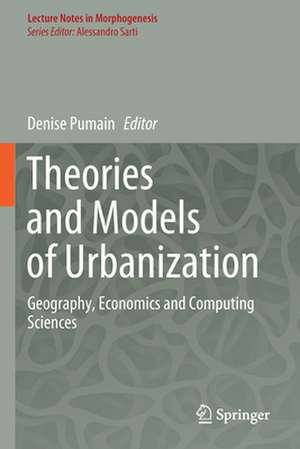Theories and Models of Urbanization: Geography, Economics and Computing Sciences: Lecture Notes in Morphogenesis
Editat de Denise Pumainen Limba Engleză Paperback – 4 ian 2021
| Toate formatele și edițiile | Preț | Express |
|---|---|---|
| Paperback (1) | 1050.07 lei 6-8 săpt. | |
| Springer International Publishing – 4 ian 2021 | 1050.07 lei 6-8 săpt. | |
| Hardback (1) | 1116.09 lei 6-8 săpt. | |
| Springer International Publishing – 4 ian 2020 | 1116.09 lei 6-8 săpt. |
Din seria Lecture Notes in Morphogenesis
- 18%
 Preț: 1118.45 lei
Preț: 1118.45 lei - 15%
 Preț: 585.73 lei
Preț: 585.73 lei - 24%
 Preț: 708.08 lei
Preț: 708.08 lei -
 Preț: 391.61 lei
Preț: 391.61 lei - 20%
 Preț: 426.75 lei
Preț: 426.75 lei - 18%
 Preț: 731.28 lei
Preț: 731.28 lei - 15%
 Preț: 649.87 lei
Preț: 649.87 lei - 18%
 Preț: 1223.25 lei
Preț: 1223.25 lei - 15%
 Preț: 643.84 lei
Preț: 643.84 lei -
 Preț: 393.90 lei
Preț: 393.90 lei -
 Preț: 391.22 lei
Preț: 391.22 lei - 15%
 Preț: 643.34 lei
Preț: 643.34 lei -
 Preț: 361.74 lei
Preț: 361.74 lei - 20%
 Preț: 980.22 lei
Preț: 980.22 lei - 15%
 Preț: 639.59 lei
Preț: 639.59 lei - 18%
 Preț: 885.00 lei
Preț: 885.00 lei - 24%
 Preț: 688.56 lei
Preț: 688.56 lei - 18%
 Preț: 721.68 lei
Preț: 721.68 lei - 24%
 Preț: 727.36 lei
Preț: 727.36 lei - 24%
 Preț: 915.57 lei
Preț: 915.57 lei - 18%
 Preț: 727.18 lei
Preț: 727.18 lei - 18%
 Preț: 1114.83 lei
Preț: 1114.83 lei - 18%
 Preț: 725.61 lei
Preț: 725.61 lei - 18%
 Preț: 837.96 lei
Preț: 837.96 lei
Preț: 1050.07 lei
Preț vechi: 1280.58 lei
-18% Nou
Puncte Express: 1575
Preț estimativ în valută:
200.94€ • 214.86$ • 167.53£
200.94€ • 214.86$ • 167.53£
Carte tipărită la comandă
Livrare economică 17 aprilie-01 mai
Preluare comenzi: 021 569.72.76
Specificații
ISBN-13: 9783030366582
ISBN-10: 3030366588
Ilustrații: VIII, 330 p.
Dimensiuni: 155 x 235 mm
Greutate: 0.48 kg
Ediția:1st ed. 2020
Editura: Springer International Publishing
Colecția Springer
Seria Lecture Notes in Morphogenesis
Locul publicării:Cham, Switzerland
ISBN-10: 3030366588
Ilustrații: VIII, 330 p.
Dimensiuni: 155 x 235 mm
Greutate: 0.48 kg
Ediția:1st ed. 2020
Editura: Springer International Publishing
Colecția Springer
Seria Lecture Notes in Morphogenesis
Locul publicării:Cham, Switzerland
Cuprins
Introduction.- Theories of complexity and urban systems.- Scaling laws: universal solutions for urban planning or contingent products of circumstances?.- Economy versus geography: theories of urbanization and cities development.- Urban theories and international comparisons.- Complex systems modeling for better understanding urbanization theories.- Conclusion.
Notă biografică
Denise Pumain trained in geography at Ecole Normale Supérieure; she was lecturer at University Paris I from 1970, researcher at the National Institute of Demography (1981–1986), Professor at University Paris 13 (1986–1989) then at University Paris I Pantheon-Sorbonne, member of the Institut Universitaire de France, Former Chair of the Commission on Urban Development and Urban Life of the IGU (1992–2000), founder of the research laboratory P.A.R.I.S. (1984), Director of the UMR Géographie-cités (CNRS 1992–2000), the European Research Group S4 (Spatial Simulation for Social Sciences, 2006–2013), Cybergeo, European Journal of Geography (founded 1996), Principal Investigator of the ERC advanced grant GeoDiverCity, http://geodivercity.parisgeo.cnrs.fr/blog/ (2011–2016). Her main scientific contribution is about building an evolutionary theory of urban systems and transferring concepts and models from self-organizing complex systems toward social sciences. She was chief executive of education and research for the Académie de Grenoble (2000–2001) and first scientific coordinator for social sciences at the French Agency for research assessment (2007–2008). She was awarded Doctor Honoris Causa at University of Lausanne and Liege and silver medal of the CNRS and Vautrin Lud International Prize in Geography in 2010. She is corresponding member of the Austrian Academy of Sciences since 2009 and corresponding fellow of the British Academy since 2012. She is officer in French Order “Legion d’honneur” and “Ordre du merite.”
Textul de pe ultima copertă
This book provides a thorough discussion about fundamental questions regarding urban theories and modeling. It is a curated collection of contributions to a workshop held in Paris on October 12th and 13th 2017 at the Institute of Complex Systems by the team of ERC GeoDiverCity. There are several chapters conveying the answers given by single authors to problems of conceptualization and modeling and others in which scholars reply to their conception and question them. Even, the chapters transcribing keynote presentations were rewritten according to contributions from the respective discussions. The result is a complete “state of the art” of what is our knowledge about urban processes and their possible formalization.
Caracteristici
Presents the discussion of controversial questions by experts in urban sciences Provides clear presentation of diverging and converging visions about crucial urban issues Discusses the views from famous prominent scholars in major parts of the world
